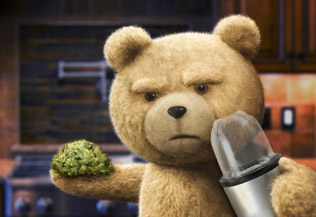Movie Review: Ted 2
By Ben Gruchow
July 6, 2015
BoxOfficeProphets.com

The movie starts with promise; during an opening-credits dance number, choreographed by Rob Ashford with a considerable amount of precision and skill, I realized a couple of things: one, director Seth MacFarlane’s sporadic attempts to convey scope and musicality are far more successful in live action than they are in primetime animation; two, the movie’s cinematography is pretty fantastic. The ultra-wide 2.35:1 aspect ratio is patently unnecessary - there’s hardly a composition that wouldn’t fit better in a 1.85:1 frame, apart from that opening dance number - but you can lay that claim at the feet of almost any tentpole. Regardless of aspect ratio, though, Ted 2 is visually striking in a sense that goes way above and beyond the call of duty for this kind of studio tentpole. It’s not groundbreaking, but you take your small victories where you can get them in a film by the guy responsible for Peter Griffin.
It’s probably a good thing that the visuals of the movie don’t do anything more laudatory, lest I have a hernia over the contrast between form and content on display. That opening really is the best part of the film, and it isn’t long before things start to unravel. Consistency of tone is the first thing to falter. Consider the big moment that sets the movie’s main plot in motion, when Ted and girlfriend Tami-Lynn decide to have a baby. This scene is played more or less straight. In the next scene, it’s discovered that a character’s laptop is stocked with a dizzying array of adult material. It must be purged…but no, not through deletion. The data can be recovered. We cut to the characters smashing the laptop in an alley. Still not good enough, because the circuit boards can be re-constituted. We cut to the same characters in scuba gear, sinking the laptop to the bottom of the sea.
One of these sequences belongs in a slapstick farce, and one of them does not, and no attempt is made to reconcile the two self-contained realities within these scenes. This is an issue that grows and grows over the course of Ted 2. I may be a big grouch for requesting tonal consistency from my raunchy summer comedy, but you know what? If you want to see it accomplished without sacrificing laughs or story, Spy is still knocking around theaters.
Ted 2’s narrative pull concerns questions of personhood and equal rights for minorities, and it’s the movie’s bad luck that it arrived in theaters on exactly the same day that the U.S. Supreme Court ruled on Obergefell v. Hodges. The metaphor here is pretty transparently about marriage equality, and the real-world protection of same-sex marriage under the Fourteenth Amendment pretty much instantly renders the movie irrelevant on a substantive level that it pretty clearly wants to be considered on. In a way, it looks much more retrograde than I’m sure it was intended to be: having been witness to arguments for marriage equality that were truly moving and well-articulated, Ted 2’s version of arguing for minority rights comes across more like an individual who passionately rallies for a cause without ever understanding why. In blunter terms, the movie’s argument comes across like a particularly ill-informed teenager. The movie’s attempts at political satire are occasionally successful but just as random in their aim (one quick joke, involving a panel of articulate cable-news commentators intercut with four old men on Fox News, achieves an honest laugh without ever being as biting or witty as your average Daily Show episode).
I mentioned that the film goes from problematic to actively bad at the wrong moment, and so it does. For roughly an hour, we’re guided toward sophomoric laughs, goofy slapstick, or cheap dramatics, and the movie’s basically daring us to follow it on anything more than a complacent, let’s-just-wait-for-the-next-gag level. Then the lack of tonal discipline on display reaches a crescendo in a bizarrely misconceived climactic set piece, one that sees the movie’s fragile hold on its comic timing (and its visual depth and sophistication) dissipate completely. The set piece takes place, for reasons unknown, in the New York Comic-Con. It involves the unnecessary return of a major character from the first film. It involves a mean-spirited take on convention attendees that garners no laughs, let alone any insight. It involves character motivations and actions that require ignorance of events in the first film that they clearly understood then. Nothing about this sequence works, and it’s a major component of the film’s final act.
From this point, the game is more or less called. The storyline plays out about how you think it will, with the exception of one final transgression against tone that sees the collision between drama and comedy actually break the film. The scene takes place in a hospital room, and is transparently mounted; I watched with something akin to dread, knowing the general shape of the stunt the scene was about to pull if not the specifics, and I was relieved when the scene reached its foregone conclusion.
The movie is at its best when it doesn’t try so hard to score the punchline. There was never a great movie to be made out of Ted 2, and there maybe wasn’t even a particularly good one, but I’d argue that there was a way to avoid the swan-dive in quality that the movie takes in its final half-hour. The movie offers a brief appearance by Morgan Freeman, who takes the time to advise our stuffed protagonist that he has never once done anything of value, and nothing to contribute to society or to make the world a better place. Something’s gone wrong in your buddy comedy when you realize that the protagonist has no defense for that.